What Is A Hiring Manager? This is a question many job seekers and those new to the world of human resources often ask. At WHAT.EDU.VN, we aim to provide clear, concise answers to all your queries, offering valuable insights into this crucial role in the recruitment process. Learn more about their roles and responsibilities.
1. What Is A Hiring Manager?
A hiring manager is a pivotal person in an organization, responsible for filling vacancies within their department. Essentially, they are the future supervisor of the new employee. This individual initiates job requisitions, oversees open positions, conducts interviews, and ultimately decides who gets hired, followed by onboarding the new team member.
The hiring manager can be anyone leading a team or department, such as a Sales Director or Retail Manager. In smaller organizations or startups, the CEO often assumes this role.
The hiring manager collaborates with the recruiter, who handles the operational and administrative aspects of the hiring process, while the hiring manager makes the final decisions.
2. What Does A Hiring Manager Do?
The hiring manager has numerous responsibilities throughout the recruitment process. Let’s explore them in detail.
2.1. Initiate the Recruitment Process
When a vacancy arises, the hiring manager formally requests a new position through a job requisition. They typically conclude the recruitment process by selecting the candidate to hire.
2.2. Convey Key Information During the Vacancy Intake
Once the job requisition is approved, the recruiter meets with the hiring manager to gather comprehensive information about the vacant position.
The recruiter and hiring manager clarify the following details to kickstart the recruitment process:
- Required candidate profile
- Essential skills, experience, and personality traits
- Performance expectations for the role
- Potential impact of a high performer on the team and organization
- Attractive compensation and benefits
- Weekly working hours and overtime policy
- Budget for the position
The more detailed the information the recruiter obtains, the better the job description, which improves the fit between candidates, the job, and the company culture.
2.3. Sharing the Responsibility of Tasks
Traditionally, recruiters bear most of the recruitment workload. To balance this, responsibilities should be clearly defined at the outset.
Using a RACI matrix (Responsible, Accountable, Consulted, Informed) can help outline tasks and provide a reference point for everyone involved.
Blinkist, a book-summarizing service, uses a Decentralized Autonomous Hiring© model, sharing responsibilities between hiring managers and recruiters. Recruiters act as “sparring partners,” offering support and advice based on the hiring manager’s experience. This results in a more efficient process and improved candidate experience.
2.4. Keeping in Close Contact with the Recruiter
Throughout the recruitment process, the manager maintains close contact with the recruiter to clarify the vacancy and the ideal candidate profile. This collaboration may involve a freelance recruiter or a specialized headhunting firm, depending on the organization’s size and internal recruitment capabilities.
2.5. Interviewing Candidates
After the recruiter identifies potential candidates who pass the initial screening, the hiring manager conducts in-depth interviews to assess their technical skills and suitability before making a final decision.
2.6. Finding a Candidate That Fits and Making the Hiring Decision
The hiring manager focuses on selecting a candidate who not only brings valuable skills and experience but also complements the existing team dynamics.
After interviewing shortlisted candidates, the hiring manager makes the final hiring decision.
2.7. Onboarding and Managing New Hires
The hiring manager is vital in the employee onboarding process, ensuring new hires feel welcome, integrate into the company culture, and have the resources they need to succeed.
They serve as the primary contact for new employees, addressing any concerns. The hiring manager also continuously monitors and evaluates new hires’ performance, providing feedback and guidance to support their development within the company.
2.8. Learning and Development
The hiring manager should clearly understand the desired direction for team development, aligning with the organization’s goals and identifying individual learning and development needs.
Having a learning and development (L&D) strategy in place is advantageous during interviews, as the hiring manager can share potential development opportunities.
2.9. Other Responsibilities
Responsibilities like coaching, developing team members, and supporting employee well-being, while not directly related to hiring, influence how candidates and employees perceive the organization.
A company known for prioritizing its people through coaching, mentoring, or wellness programs enhances its reputation among job seekers, making it easier to attract top talent.
3. Hiring Manager Vs. Recruiter
The terms “hiring manager” and “recruiter” are often used interchangeably, but they represent distinct roles.
Here’s a recap of their differences:
- Hiring Manager: The future supervisor of the new hire. They initiate the hiring process, conduct interviews, select candidates, and manage onboarding. Hiring is just one component of their leadership responsibilities.
- Recruiter: A professional who promotes vacancies and identifies, attracts, and pre-selects suitable candidates. They are part of the Recruitment, Talent Acquisition, or HR team.
Tensions can arise because the hiring manager has the final say. Managers often want to quickly fill positions, while recruiters prefer a thorough candidate assessment and a comprehensive selection process. It is up to the recruiter to guide the hiring manager and discourage rushing the hiring process.
Rather than seeing the hiring manager versus the recruiter, consider them allies working together.
4. Hiring Manager Vs. HR
Hiring managers are also frequently confused with Human Resources professionals, as both may participate in the recruitment process.
HR is a team that handles various responsibilities, including identifying candidates, managing recruitment administration, supporting employees, overseeing learning and development, and addressing grievances.
Hiring managers identify staffing needs, secure recruitment approvals, create job descriptions, serve as interview contacts, lead in-depth interviews, and make final hiring decisions.
5. Why Your Organization Needs a Strong Recruiter and Hiring Manager Relationship
Hiring managers and recruiters often have different priorities: the urgency to hire and the need for a systematic selection process.
A strong relationship ensures that each person knows their responsibilities, that the recruitment process is seamless, and that the right candidate is hired.
A study by Bersin by Deloitte Consulting LLP found that developing strong relationships with hiring managers was the biggest driver of a stronger talent acquisition department. Here’s why this relationship is crucial:
- Effective and Efficient Hiring Process: Both roles are vital for an effective hiring process. Collaboration is essential for speed, efficiency, and quality.
- Improved Quality of Candidates: The stronger the relationship, the better the recruiter understands the ideal candidate profile and skills, increasing the chances of attracting and hiring a top candidate who fits well.
- Better Candidate Experience: A seamless, fast, and effective hiring process improves the experience for all candidates. This helps retain top candidates and prevents them from being poached by competitors due to poor communication or long waiting times.
- Decreased New Hire Turnover: Alignment between recruiter and hiring manager leads to a better overall fit and reduces new hire turnover rates.
- Easier Problem Solving: A strong working relationship facilitates easy handling of challenges, preventing escalation.
6. How to Improve the Recruiter and Hiring Manager Relationship
Here are tips for recruiters to strengthen their relationships with hiring managers:
6.1. Understand Hiring Managers’ Needs
It’s crucial to understand the role requirements and what the manager seeks, including skills, experience, team culture, and dynamics. Prepare targeted questions for meetings with hiring managers.
6.2. Clarify Roles and Responsibilities
Define responsibilities for each person involved in the hiring process. A RACI chart can provide clarity for everyone.
Reiterating responsibilities throughout the process ensures everyone knows what to do.
6.3. Establish Clear Communication
Provide regular updates and communicate progress, challenges, and needs. Know each other’s preferred contact method (email, messaging, video calls, phone calls).
6.4. Organize Hiring Manager Training
The recruitment process can be daunting, especially for new leaders. Offer training on the process and common mistakes to avoid.
This includes interview training, unconscious bias training, and legal aspects of hiring, boosting confidence and interview quality.
Also, keep hiring managers informed about talent trends by presenting recruitment data to manage expectations.
6.5. Be Proactive
Anticipate needs and offer help without waiting for requests. Regularly check in with hiring managers.
6.6. Conduct a Hiring Manager Satisfaction Survey
Gather feedback on the recruitment process to improve the hiring process, candidate quality, and your relationship with the hiring manager.
6.7. Follow Up
After a new hire starts, follow up to ensure they are integrating well. This demonstrates a commitment to long-term success.
Address any concerns collaboratively and develop preventative actions.
7. Recruiter Email Template to Hiring Manager
Here’s a template a recruiter can use to update a hiring manager:
| Subject line: Quick update on the status of [Job_title] position |
|---|
| Hi [Hiring Manager’s_name], |
| Hope you’re well. |
| Please find a brief recap on where we currently stand with hiring for the [Job_title] role: |
| Applications received: [e.g. 56] |
| Phone screening calls conducted: [e.g. 10] |
| Applicants we advanced to the in-person interview phase: [e.g. 3] |
| Interviews scheduled for next week: [e.g. 3] |
| Deadline for completing all interviews: [e.g. 12/09/2023] |
| Please find some additional notes on the qualified candidates: |
| [Candidate1_name]: Has 18 months experience in a similar role at a competitor, contacted one of our recruiters directly about an open position, so seems quite keen. |
| [Candidate2_name]: Is a recent graduate with no formal experience but some relevant internship experience. Very friendly in our phone conversation. |
| [Candidate3_name]: Has 6 months of experience in a similar role as well as experience working overseas, which I know you mentioned could be of benefit to the team. |
| Please find a more detailed review attached [attach file to email.] |
| Let me know if you have any questions or want to schedule a quick call or meeting to discuss ahead of our interviews. |
| Thank you, |
| [Recruiter_name] |
| [Recruiter_signature] |
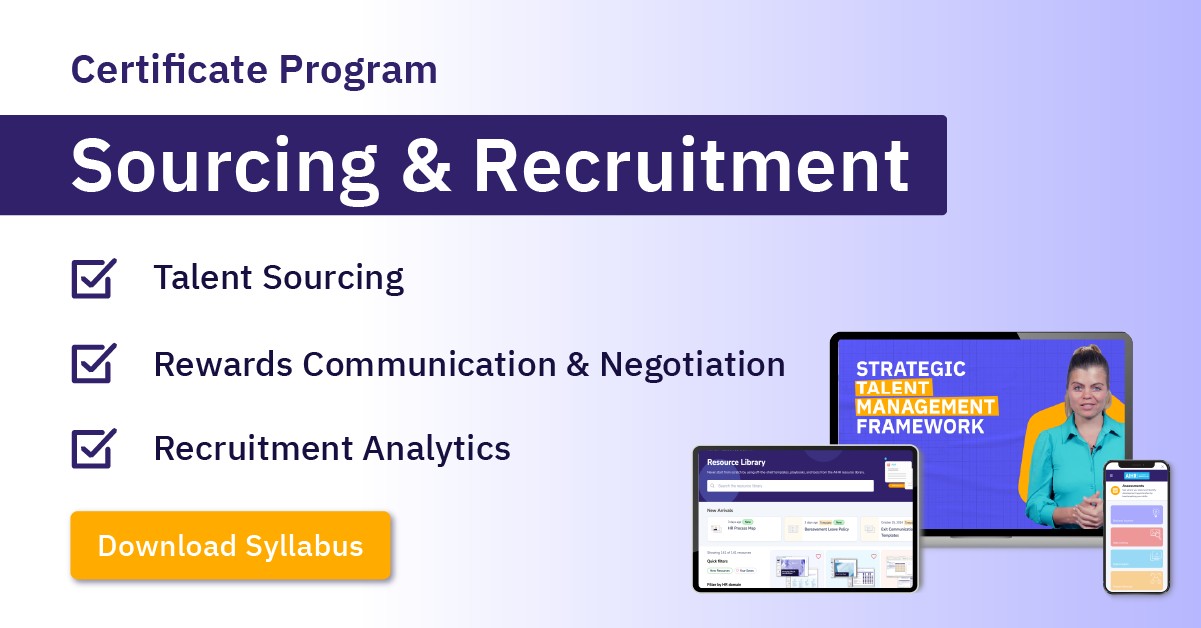
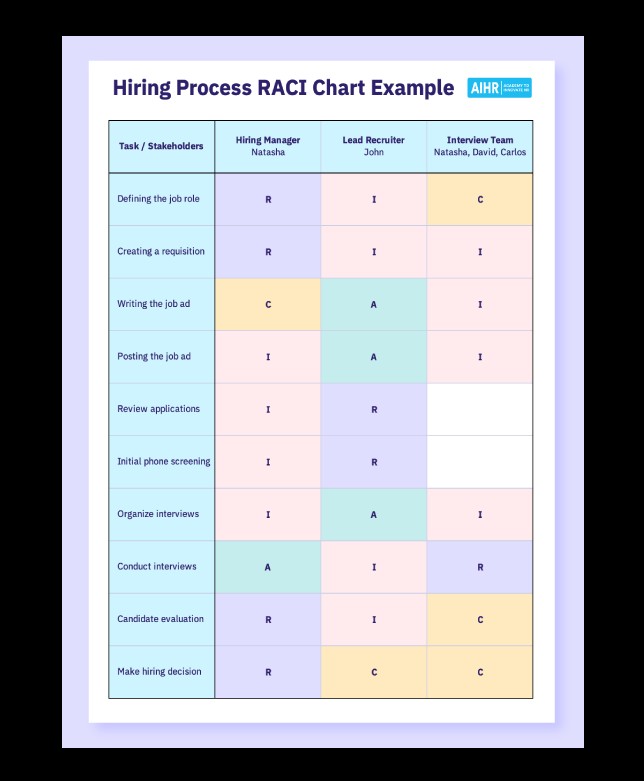
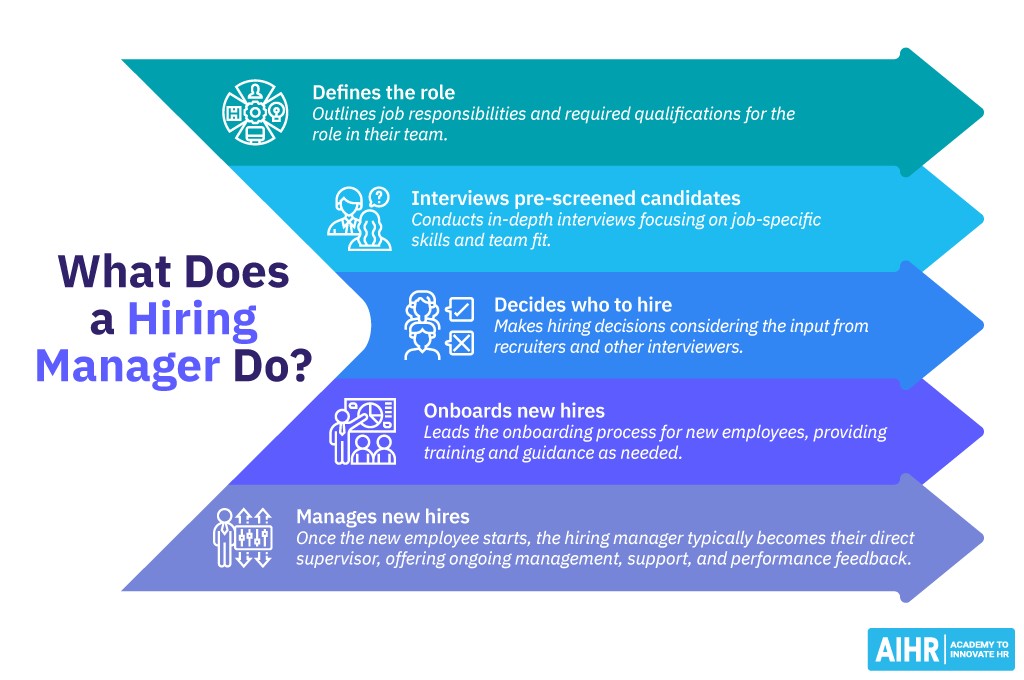
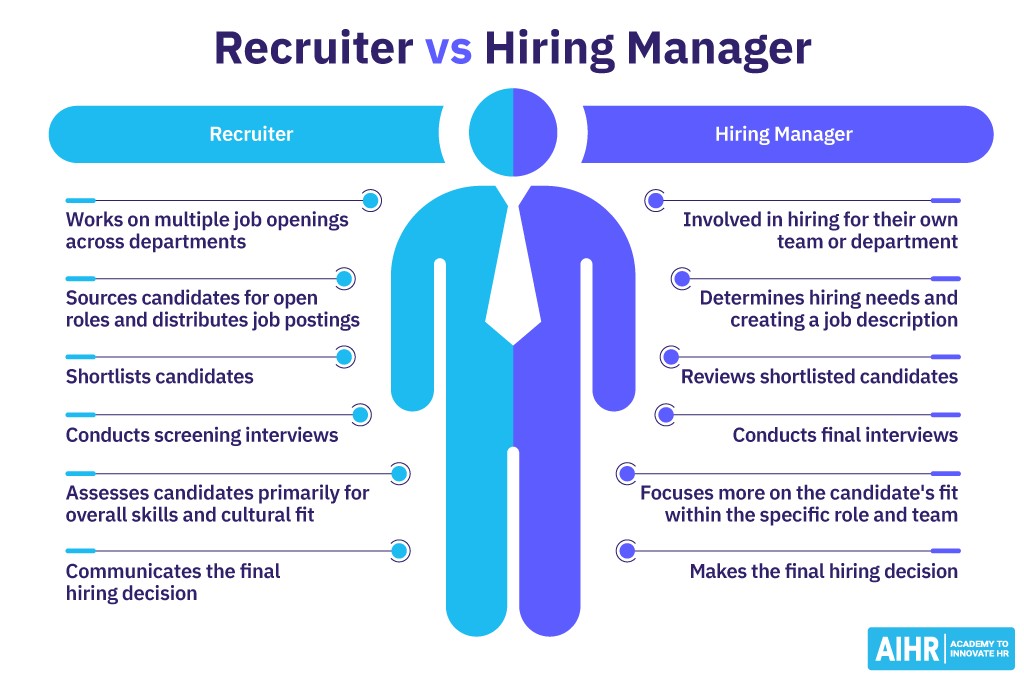
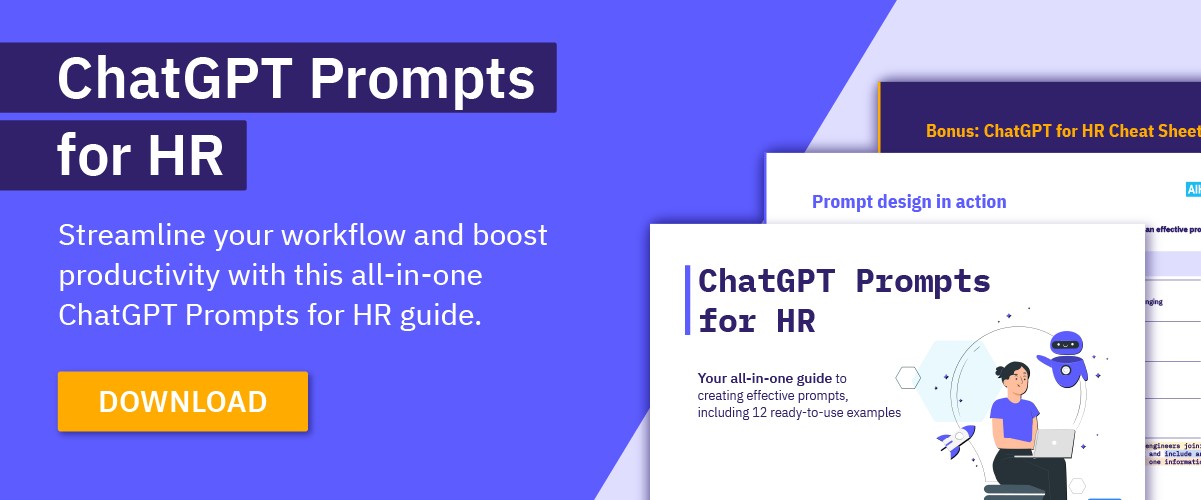
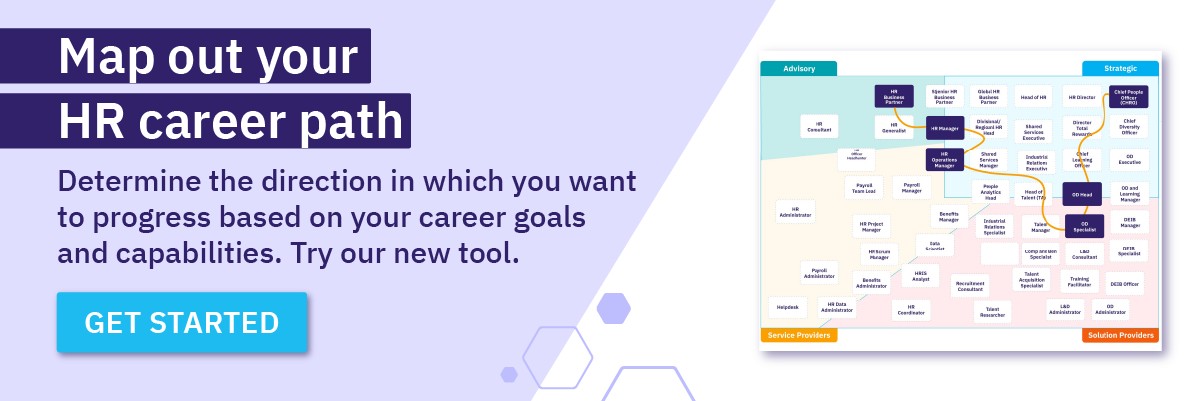
8. Wrapping Up
The hiring manager’s role is multifaceted, from initiating the process to leading interviews, making hiring decisions, and onboarding.
A strong relationship between the hiring manager and recruiter makes the hiring process effective and efficient. Recruiters who can build and maintain such relationships help the organization recruit top-tier talent that aligns with its values and objectives.
9. FAQ
Here are some frequently asked questions about hiring managers:
What is a hiring manager?
A hiring manager is a department head responsible for filling a position within their team and will be the new employee’s manager. They initiate the job requisition, collaborate with the recruiter, interview candidates, decide who to hire, and manage onboarding.
Are hiring managers part of HR?
No, hiring managers are part of their respective departments. They collaborate with HR and/or the recruitment team but have different roles. HR focuses on attracting candidates and handling administrative tasks, while the hiring manager requests the vacancy be filled, interviews candidates, and ensures the best candidate is selected.
What does a hiring manager do in an interview?
In an interview, a hiring manager asks questions to assess whether a candidate has the skills, experience, knowledge, and behavioral traits needed to succeed and fit into the team.
Do you have more questions about hiring managers or any other career-related topics? Visit WHAT.EDU.VN to ask your questions and receive free, expert answers. Contact us at 888 Question City Plaza, Seattle, WA 98101, United States, or reach us via WhatsApp at +1 (206) 555-7890. We’re here to provide the information you need!
At WHAT.EDU.VN, we understand the challenges of finding reliable information quickly and freely. That’s why we offer a platform where you can ask any question and receive prompt, accurate, and easy-to-understand answers. Join our community today and experience the convenience of having your questions answered by knowledgeable experts.
Share your questions on what.edu.vn and let us help you find the answers you seek! Get free advice and answers now.